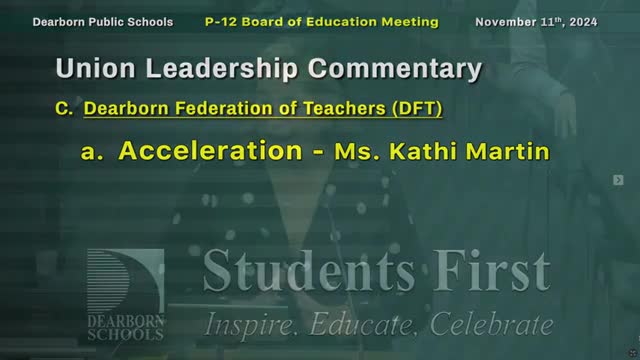Teachers Overwhelmed by New Acceleration Demands
November 12, 2024 | Dearborn City School District, School Boards, Michigan
This article was created by AI summarizing key points discussed. AI makes mistakes, so for full details and context, please refer to the video of the full meeting. Please report any errors so we can fix them. Report an error »

In a recent government meeting, educators voiced significant concerns regarding the implementation of acceleration programs aimed at improving student literacy and math skills. A survey conducted among middle school teachers revealed that while there is consensus on the necessity of these programs, the burden on teachers has become increasingly unsustainable.
The survey, primarily involving 6th, 7th, and 8th grade teachers, highlighted that the current acceleration model is adding to their workload. Teachers are already contracted to teach a maximum of 25 sections per week, and the introduction of acceleration has effectively created an additional class, further straining their time and resources. Many teachers reported spending between 21 to 30 hours, or even more than an hour weekly, preparing for these acceleration sessions, which are typically shorter than standard class periods.
The disparity in preparation time between subjects was also noted, with English Language Arts (ELA) acceleration requiring more extensive preparation compared to math acceleration, which is less demanding due to its focus on computational skills rather than writing.
Educators expressed feelings of being overwhelmed and overworked, raising concerns about the sustainability of the current acceleration approach. The meeting underscored the urgent need for a reevaluation of the program to better support both teachers and students in achieving educational goals without compromising teacher well-being.
The survey, primarily involving 6th, 7th, and 8th grade teachers, highlighted that the current acceleration model is adding to their workload. Teachers are already contracted to teach a maximum of 25 sections per week, and the introduction of acceleration has effectively created an additional class, further straining their time and resources. Many teachers reported spending between 21 to 30 hours, or even more than an hour weekly, preparing for these acceleration sessions, which are typically shorter than standard class periods.
The disparity in preparation time between subjects was also noted, with English Language Arts (ELA) acceleration requiring more extensive preparation compared to math acceleration, which is less demanding due to its focus on computational skills rather than writing.
Educators expressed feelings of being overwhelmed and overworked, raising concerns about the sustainability of the current acceleration approach. The meeting underscored the urgent need for a reevaluation of the program to better support both teachers and students in achieving educational goals without compromising teacher well-being.
Don't Miss a Word: See the Full Meeting!
Go beyond summaries. Unlock every video, transcript, and key insight with a Founder Membership.
✓
Get instant access to full meeting videos
✓
Search and clip any phrase from complete transcripts
✓
Receive AI-powered summaries & custom alerts
✓
Enjoy lifetime, unrestricted access to government data
30-day money-back guarantee

